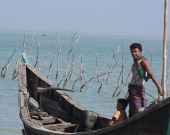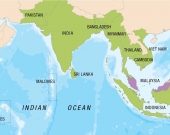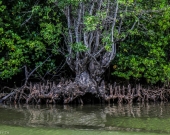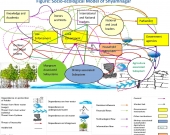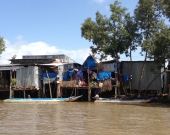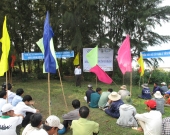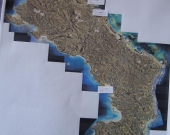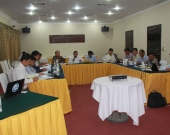Newsroom :: Newsletter :: MFF Newsletter 29
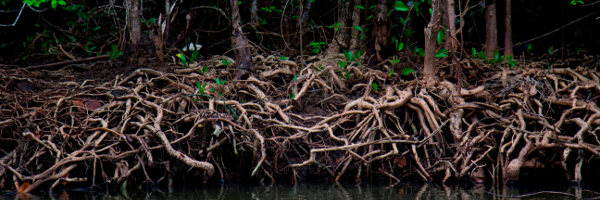
|
Mangroves for the Future Newsletter - Issue 29
Welcome!
The fifth report from the Working Group on Climate Change and Development Up in Smoke? Asia and the Pacific (IIED) foresees that the human drama of Climate Change will largely be played out in Asia, where over sixty percent of the world's population live. The Intergovernmental Panel on Climate Change (IPCC) in their report estimates that by 2020 almost 50 million more people will be at risk of hunger, and that rising sea levels will threaten the future of many island and coastal communities across the region. In this context it is imperative for the long term sustainability to include Climate Change considerations in any developing initiative, programme or intervention addressing coastal management issues.
MFF's earlier attempts to address climate related impacts on coastal communities and ecosystems culminated with the "Climate Proof" document from 2010, a stepwise guide to incorporating resilience and adaptive capacity components into project design. Building on the experience and foundation of its previous work and with specific support from Danida and Norad, in 2012 MFF began developing a more systematic and holistic approach to address coastal management issues, including climate change. MFF calls this the "Resilience Approach", where social resilience and ecosystem resilience are considered inter-related and, as functions of each other, co-dependent.
By applying the "Resilience Approach", MFF aims to explore the dynamics and interactions of environmental and social systems, as well as to lay the foundation for developing the most effective management strategies to enhance resilience in varied spatial and ecological contexts. For this purpose MFF has developed a Resilience Framework through a series of rigorous analytical exercises in a consultative process with member countries and relevant experts. The MFF Resilience Framework is currently being tested in Bangladesh and will upon completion be applied in all MFF member countries as the overall mechanism for a strategic delivery of the MFF Grant Facilities.
In this issue, we invite you to learn more about the "Resilience Approach" and the MFF Resilience Framework, along with news and updates from around the region.
Best Wishes,
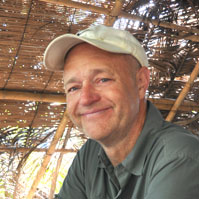
Steen Christensen
Coordinator
Mangroves For The Future
MFF online survey
Please take a short online survey to help make the MFF newsletter better: Take Survey
Regional Activities
From "Climate Proof" to Coastal Community Resilience
19 Jul 2013
Mangroves for the Future (MFF) has included Climate Change as a cross-cutting theme since 2008. In 2010, jointly with UNEP, UNDP and IUCN, MFF published 'Climate Proof', a four-step guide to assist proponents in considering the potential impacts of Climate Change on projects. As MFF developed the need for a more holistic and programme-wide application of climate change considerations evolved.
MFF releases consolidated Guidelines for Grant Facilities
29 Jul 2013
MFF releases a consolidated set of guidelines for its grants facilities. This will cover guidelines for the Small Grant Facility (SGF), Medium Grants Facility (MGF), and Regional Grants Facility (RGF). The MS Word version of templates for concept notes and full proposals (attached as Annexes to the Guidelines) is also included.
Special Meeting of IUCN Regional Directors discusses replication of Mangroves for the Future Initiative beyond Asia
Bangkok, Thailand 05 Jun 2013
Regional Directors from IUCN Asia, Central America, Eastern and Southern Africa, Western and Central Africa and Oceania met in Bangkok, Thailand from 4 -5 June for a special meeting to discuss the Mangroves for the Future (MFF) Initiative as a successful and replicable model programme for other IUCN regions.
Country Updates
Shyamnagar community sees its future through resilience lens
Shyamnagar, Satkhira, Bangladesh 30 Apr 2013
Citizens of the southwest upazilla of Bangladesh- Shyamnagar, framed its possible future scenarios and one desired vision as MFF team introduced them to the concept of social-ecological thinking to understand the state of resilience. They developed strategies to reach their vision- "Shonar Shyamnagar-2050' in the upcoming decade. The initiative is expected to lead to strategic action plan developed by the stakeholders for coordinated action to make possible its vision.
Stopping charcoal production in Mui Ca Mau National Park: work without end
Ha Noi, Viet Nam 11 Jul 2013
How to protect mangrove conservation from charcoal production if we cannot secure alternative livelihoods for the landless local households ?
Planting, protecting, and sharing: three indispensable links in mangroves conservation
Ha Noi, Viet Nam 17 Jul 2013
Training and raising awareness for local community will not be enough to make them protect mangroves and environment. The story below has shown that only when the local people are benefited from nature conservation, they will be willing to protect environment.
MFF and Red Cross Society in Seychelles assists three districts in disaster risk reduction and resilience
Mahe, Seychelles (Roche Caiman, Ile Perseverance, Anse Boileau) 01 Jul 2013
A small grant facility (SGF) project of MFF responds to the need of improving local awareness about disaster risk management and reduction. Its primary aim is to strengthen community resilience through a disaster risk reduction approach at community level in the districts of Roche Caiman, Anse Boileau and Ile Perseverance.
Cambodia prepares to join MFF as tenth member country
Pnomh Penh, Cambodia 22 Aug 2013
Following the approval of its National Strategy and Action Plan in July, Cambodia is expected to join MFF as the tenth member country within 2013.
Links, Resources and Publications
Events & Others
- Regional mangrove training course, Thailand (Click to view)
- 10th Regional Steering Committee Meeting, Viet Nam (Click to view)
- Regional Fisheries symposium, India (Click to view)
